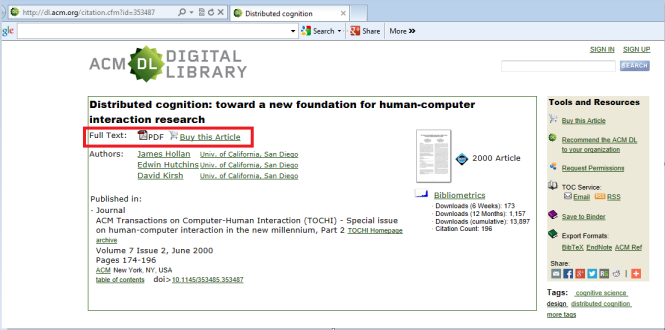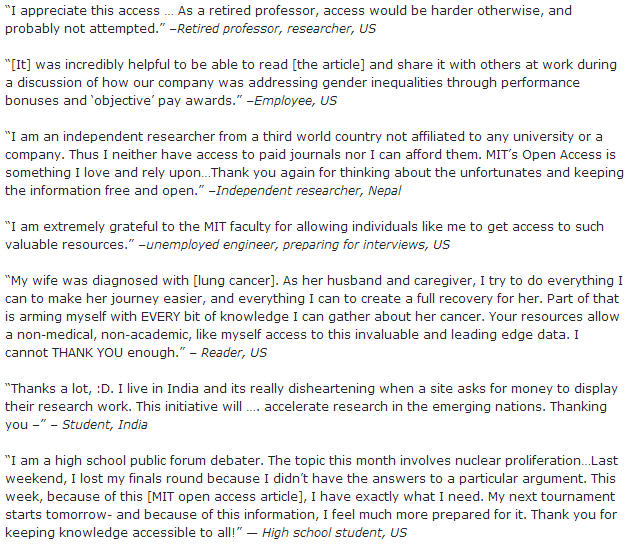Ever encountered having to purchase an online article just for your research purposes on the Internet? Below is an example.
Ever wonder what is the cause of this? Well, the answer is simple; you are not accessing an open access file. Wait, do you mean not everything on the internet is freely accessible?
Yes, you got that right.
According to Open Access Blog, Open Access is a free and immediate online availability of research articles (Open Access Button). Presently, most of the scholarly research articles can only be accessible through expensive journal subscriptions known as ‘paywalls’ (Open Access Button). The purpose of Open Access is to provide everyone the advantage of accessible knowledge for free. (Open Access Button).
Watch this video to learn more about Open Access Button.
Since we are into this topic ‘Open Access’, let’s look at some of the pros and cons of freely accessible online articles.
Firstly, with the existence of open access, it creates a free access to learning (Francesca, 2014). Everyone has the ability to learn without having to pay those high fees in order to access these materials. Secondly, because it’s free, it allows anyone to access that material anytime, anywhere (Francesca, 2014). This is exceptionally true given the digital world we live in. Also, as the connections widens, this definitely helps to increase the number of readers of a specific author’s works (Francesca, 2014). The author is able to share its work with the ease of little to no cost as compared to traditional publication methods of expensive printing and distribution costs (Francesca, 2014).
However, Open Access still has its disadvantages. Firstly, when you produce an online article for free, it is difficult to sustain it without people paying you despite you may be credited for references (Francesca, 2014). As such, you may not want to publish your content for free. Secondly, if you produce an open access article, you might be criticised for being ‘low class’ because the revenue is obtained from you rather than the readers (Mark & Christopher, 2005). Therefore it may result in fewer selections and the lack of peer review (Open Access Working Group, 2012).
In conclusion, I think it really blot down to the objective of the content producer. If his motive is to make momentary profit and not for educational purposes, then open access will definitely not be one of his choices. However, if the content producer chooses to go open access, his return may not be all that painful after all.
Here are some readers who has benefited from the open access articles from Scholarly Publishing @ MIT Libraries.
References
Distributed cognition. 2014. Distributed cognition. [ONLINE] Available at:http://dl.acm.org/citation.cfm?id=353487. [Accessed 09 December 2014].
yeeeh on Make A Gif. 2014. yeeeh on Make A Gif. [ONLINE] Available at:http://makeagif.com/7kZVeN. [Accessed 09 December 2014].
FAQ | Open Access Button . 2014. FAQ | Open Access Button . [ONLINE] Available at: http://blog.openaccessbutton.org/faq/. [Accessed 09 December 2014].
Bringing the Open Access Button (2.0) to mobile | Jisc elevator. 2014.Bringing the Open Access Button (2.0) to mobile | Jisc elevator. [ONLINE] Available at: http://elevator.jisc.ac.uk/sosi14/ideas/bringing-open-access-button-20-mobile. [Accessed 09 December 2014].
Advantages and Disadvantages of Open Access to Online Materials Topic 5 #Uosm2008 | FrancescaGerard . 2014. Advantages and Disadvantages of Open Access to Online Materials Topic 5 #Uosm2008 | FrancescaGerard . [ONLINE] Available at:http://managingmydigitallife.wordpress.com/2014/05/04/advantages-and-disadvantages-of-open-access-to-online-materials-topic-5-uosm2008/. [Accessed 09 December 2014].
. 2014. . [ONLINE] Available at:http://mccabe.people.si.umich.edu/McCabeSnyder.pdf. [Accessed 09 December 2014].
Open Access: Not just a matter for scientists | Open Access Working Group . 2014. Open Access: Not just a matter for scientists | Open Access Working Group . [ONLINE] Available at: http://access.okfn.org/2012/05/17/open-access-not-just-a-matter-for-scientists/. [Accessed 09 December 2014].
Scholarly Publishing – MIT Libraries | Readers Share Their Stories: Comments on Open Access Articles . 2014. Scholarly Publishing – MIT Libraries | Readers Share Their Stories: Comments on Open Access Articles . [ONLINE] Available at: http://libraries.mit.edu/scholarly/comments-on-open-access-articles/. [Accessed 09 December 2014].




Hello Elisha!
I do agree with you that knowledge sharing is extremely important, it is the main reason why some of us choose go to university anyway. The bid to learn more and improve ourselves instead of just chasing a qualification.
I wanted to ask with free access to learning, you don’t have to pay to get a qualification, however, what those of us paying for education? Do you think it causes a divide? Especially with employers who think that “hey this person got his degree online, is it credible?”
Great post by the way!
LikeLiked by 1 person
Hello Vanessa! Thanks for the compliment. You have asked a really interesting question in regards to getting qualifications online and the credibility behind it. I will definitely say that there will be a divide between paid education and free education. Our main objective of landing onto a degree programme is mainly because we want to get a job that offers a better pay. Well, at least that’s what our country’s salary statistics tells us in the past years, won’t you agree?
I did some research on employer’s views on online degree and two articles that I read on states that employers’ view of online education have improved over the years and the answer to whether an online degree can assist you in getting a job is yes. However, the view on the credibility of an online degree in prospective employees still remains. Concerns such as how are the students graded and assessed and online classes may not be that challenging as traditional college courses are raised up. (Kayla, 2012)
So if an online degree can get us a job, should we still pursue a traditional college degree? My answer to that is also yes. Well, first and foremost, even though online degrees are getting better recognition but older generations’ employers may still have concerns over the credibility of your online degree, thus giving you an extra barrier in landing the job. Secondly, when you pursue a traditional college degree, you are able to take advantage of the campus life and build connections on your social life. Also, you might get yourself internship opportunities and or study programs which allow you to be subsided by the government given that you are in a public school. (World Wide Learn)
In conclusion, it really depends on you whether you want to pursue your degree online or on campus. This is because at the end of the day, statistics have shown that having a degree will definitely allow you to land a job which will give you a higher pay.
I hope I have answered your question. Thanks to you, I have gotten further insights toward online degree and traditional degree. Thank you!!
Check out the below link about the market value of online degree as a credible credential.
Click to access foglec.pdf
References
Can an Online Degree Really Help You Get a Job? | TIME.com. 2014. Can an Online Degree Really Help You Get a Job? | TIME.com. [ONLINE] Available at:http://nation.time.com/2012/10/18/can-an-online-degree-really-help-you-get-a-job/. [Accessed 10 December 2014].
How Do Employers View Online Degrees?. 2014. How Do Employers View Online Degrees?. [ONLINE] Available at:http://www.back2college.com/onlinedegrees.htm. [Accessed 10 December 2014].
Education vs. Experience | Benefits of a College Education. 2014. Education vs. Experience | Benefits of a College Education. [ONLINE] Available at:http://www.worldwidelearn.com/online-education-guide/education-vs-experience.htm. [Accessed 10 December 2014].
Advantages of Online vs. Traditional Universities | Best Online Universities. 2014. Advantages of Online vs. Traditional Universities | Best Online Universities. [ONLINE] Available at: http://bestonlineuniversities.com/5-advantages-of-online-universities-vs-traditional-universities/. [Accessed 10 December 2014].
Online vs. Traditional Education: The Answer You Never Expected. 2014.Online vs. Traditional Education: The Answer You Never Expected. [ONLINE] Available at: http://www.rasmussen.edu/student-life/blogs/college-life/online-vs-traditional-education-answer-never-expected/. [Accessed 10 December 2014].
LikeLike
Wow! Great reply! Haha! Thank you for thinking it through! 😀
LikeLike
Hey Elisha!
I really enjoyed reading your post and agree with u on your views! You mentioned how open access helps readers obtain specific information from publications without paying, and i agree with it. I feel that as we go up higher in education, the things we need to research on becomes very detailed and specific, as such many of the information we need is likely in posts by writers. Without having open access, the cost will be to large for many people and sometimes the information may only be a one use thing thus purchasing it isn’t worth it.
About how you felt about the negative aspects of open access I feel the same way about the ability to sustain the costs if no one is paying. A lot of work and people working together is what ensures that each publication is done well. Even though we do not see them working, they are working and the prices of each work is what pays them.
I would like to ask you what you feel companies can do if who want to make the information freely available to all but at the same time want to cover the costs of everything that went into the research, proofreading and publishing?
LikeLiked by 1 person
Hello Ian! Thank you very much for your valuable comment! 🙂
I presume that you are asking about my suggestion on how to create freely assessable online article without having to pay those publication fees. I did a research, two of which mentions about getting the authors to pay for the article-processing charge (APC) BUT get funded after doing so. Let me introduce you to Springer. They help authors publish online access articles but they have a list of funding that authors that can tap onto.
You might want to refer the below link for more information. You might also want to check out their video on the page at approximately 03.18 onwards on why they get the authors to pay.
http://www.springer.com/gp/open-access/open-access-funding
I hope I did answer your question and thanks for dropping by. 🙂
References
Open access funding. 2014. Open access funding. [ONLINE] Available at:http://www.springer.com/gp/open-access/open-access-funding. [Accessed 10 December 2014].
Publication Fees | PLOS. 2014. Publication Fees | PLOS. [ONLINE] Available at: http://www.plos.org/publications/publication-fees/. [Accessed 10 December 2014].
7. What funding sources are available for authors? | PLOS. 2014. 7. What funding sources are available for authors? | PLOS. [ONLINE] Available at:http://www.plos.org/smart_faq/7-what-funding-sources-are-available-for-authors/. [Accessed 10 December 2014].
LikeLike
Hello Wen Hui. Thank you for explaining in your own words what open access is about. I enjoyed reading your explanation and it has certainly refreshed my memory of what OER (open education resources) entails.
It is interesting how you have identified cost to be a double-edged sword to content producers – it can be an advantage when they want to avoid the expensive route of publishing their works through traditional publication houses, yet at the same time, it can work to their disadvantage when they end up publishing their content for free and not receive any form of compensation for it.
I think you also rightly pointed out that it depends on the motive of the content producer. That got me thinking a little deeper about how perhaps OER can complement the traditional publication houses rather than compete with them, as OER would provide more options for content producers.
I do not understand what you mean when you mentioned that content producers might be criticized for being ‘low class’ because the revenue is obtained from them? Perhaps you could elaborate more?
All in all, thank you for your very informative post ☺
LikeLiked by 1 person
Hi Simon! Thanks for your valuable comment, appreciate the effort you put in commenting! 🙂
In regards to what I have mentioned about content producer being low-class, what I actually meant was that because the revenue is received from the author rather than the readers. Companies are likely to charge them at high prices in order for them to be able to cover for their losses. In order for the content producer not to ‘lose out much’ since he is the one paying the publication fee, he might lower his editorial standards which results him in being ‘low-class’ (Singaporean English :D)
I hope this explanation aids you in your understanding! 😀
You can refer to this link below and scroll down to the third part of the essay to have a clearer view.
Click to access McCabeSnyder.pdf
LikeLike